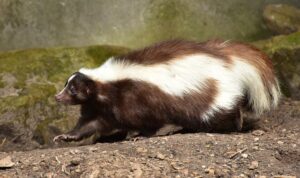
(Jeffersonville, IN) – The Indiana State Board of Animal Health (BOAH) urges local residents to vaccinate their pets and keep their distance from wildlife following the detection of rabies for the first time in 20 years in an Indiana skunk.
Testing is underway to determine the source of the skunk’s infection, and the infected skunk is now deceased.
No human infections are suspected.
“Rabies is a very dangerous disease, but it’s completely preventable,” said Dr. Melissa Justice, a veterinarian for BOAH. “The best way to prevent rabies in people and animals is to vaccinate pets.”
Rabies is a deadly viral infection that is primarily spread in saliva through the bite of an infected animal. The virus is not spread through blood, urine, feces or skunk spray. Bats are the most common source of rabies in Indiana; however, the virus may be found in wild animals such as skunks, raccoons and foxes. Unvaccinated pets and livestock can also become infected.
Dr. Justice recommends the following guidelines to reduce the risk of rabies exposure to people and animals:
· Avoid contact with wild animals (not just bats). Do not feed or handle wild animals. Secure any trash and pet food in animal-proof containers. Cover attic and chimney openings and other entry points in the home which may invite unwanted visitors.
· Animals with rabies typically act strangely, and some may be aggressive and try to bite people or other animals or act shy or be dull and unresponsive. Some rabid animals drool more than normal (“foaming at the mouth”), but this isn’t always the case. Wild animals are generally active at night and avoid contact with people. Daytime contact with humans is unusual and should be viewed suspiciously.
· Indiana law requires all dogs, cats, and ferrets 3 months of age or older be vaccinated against rabies by a licensed, accredited veterinarian. Pets should be kept close to home, as free-roaming animals are at higher risk of exposure to the disease.
· If your pet or livestock is bitten or attacked by a wild animal, contact your veterinarian and local animal control. Your pet will need a booster if the aggressor is determined to be rabid.
· If you or someone in your family is bitten or scratched by a wild or stray animal or pet, attempt to confine or capture the animal, if this can be done without risk of further injury. An unowned biting animal should be tested. An owned biter may be subject to quarantine and observation. Contact the local health department for guidance.
· Immediately wash the wound thoroughly with soap and water. Call your health care provider at once to determine treatment and ensure the bite is reported to the local department of health and animal control. Rabies in people is almost always fatal, but it can be prevented with prompt treatment after a bite.
· Anyone who sees a wild animal that appears sick should report the case to the Indiana Department of Natural Resources Division of Fish & Wildlife Health Program at on.IN.gov/sickwildlife.
For more information about rabies prevention and safety, visit the Indiana State Board of Animal Health online at www.in.gov/rabies/ .
(Indiana State Board of Animal Health press release)



